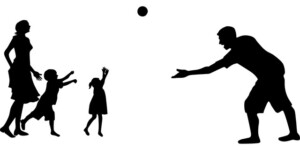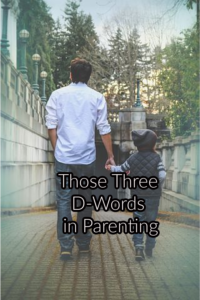Those Three D-Words in Parenting
 Recognizing D-words
Recognizing D-words
I didn’t consider those D-words when I became a mom. When we became parents, we didn’t sit down and discuss the things for which we planned to discipline our kids. I think we knew we agreed on the important things, but it might have helped had we isolated behavior into three separate categories. You take care of those three issues, and you’ll have your ducks in a row. Except when the ducks get out of a line, of course. Then you have to get them back in a row. It’s called parenting.
I think, had we actually “itemized” those categories, it might have helped me figure out better how to deal out consequences, which behaviors to zone in on, and the end goal in mind. By the time most of our kids were raised and we became foster parents, we had behavior categorized. We’d also figured out that it was not wise to allow a kid to be in charge. I discovered that it helped our kids when we explained which of those D-words they exhibited when they crossed the line on good behavior.
Non-D-word behaviors
There are some things kids do that don’t fall into these categories. When that’s the case, you don’t need to come at them with both barrels. Recognize that kids are kids and allow them to make mistakes. I’m talking about spilling milk on the floor, knocking over a glass that breaks, forgetting to close a door, or accidentally tearing a page in a book. None of these infractions involves the D-words.
You know your kids, and you can pretty much tell when something is intentional and deliberate or whether it really is an accident. As parents, we know if a child is clumsy because he’s in a hurry or because he’s not developed enough physically. We also know whether the un-closed door is laziness on the part of a kid or if he doesn’t realize he didn’t quite get it closed tightly. We must recognize that we ourselves at times spill milk, put a slight tear on a book page, fail to close the door tightly, or knock over a glass mistakenly. That’s why we give grace.
On the other side of unintentional is the attitude of deliberate intention. That’s when we need to zone in on discipline and consequences. With our kids, there were three areas we did not tolerate (except when we failed) , and you shouldn’t tolerate them either.
Defiance/Disobedience
- de·fi·ance
Dishonesty
- dis·hon·es·ty
 Disrespect
Disrespect
- dis·re·spect
Figuring it out
If you are going to discipline your child or deal out consequences, you have to have a plan. Don’t wait until something happens and then quit before you get started because you don’t know what to do. When you’re dealing with a child and you’re not quite sure what to do, ask yourself a question. “Does what my child just said or did fall into any of the three D categories? Was he disobedient, dishonest, or disrespectful? If your honest answer is “Yes!”, then deal with it.
If your child is defiant, dishonest, or disrespectful, he must receive consequences for his behavior. Don’t make excuses. Don’t count to three. He doesn’t need to hear, “Next time . . . “. He needs to see you follow your plan, and to experience parents who follow through.








